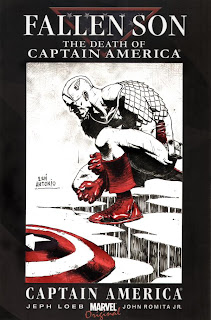Depression.
We've all felt it. We all know it's tough.
The mind aches from worry, the body becomes weak, and the person doesn't want to really do anything. Motivation is gone, emotions become overpowering, and the being is crushed.
The fourth stage of the
Kübler-Ross model brings us to
Depression. Marvel takes Spider-Man and rips away his mask of funny catch phrases and superhuman ability to show us who he truly is, a man. Even though most would see this hero as Marvel's biggest drama queen, I would argue that this is because he is Marvel's most human character. At his core, he's really just a guy who got bit by a spider and only fights because he feels that he would be shirking his responsibility if he chose not to. (With great power comes great responsibility
Amazing Fantasy 15.) Peter Parker is the one who takes Cap's death the hardest.

After running out of the New Avengers' temporary HQ in "
Anger," Spider-Man is out of sorts. He realizes how much he has failed in his life and how different it would be now without a great person like Captain America to look up to. He ends up going to the grave of his other role model, Ben Parker. Instead of being able to think of the positive, Pete falls into depression. He knows that it was his fault that Ben died and he feels powerless against the death of Captain America. Pete thinks, "They say the true legacy of a hero is based on the lives he's saved. Knowing me,
my legacy will be judged by the lives I've
lost." Not only is Spider-Man treated skeptically as a comic-book character, it is hard for people to appreciate him in his universe (616). He thinks of all the people that had been lost to him, the deaths that he feels he could have prevented. He remembers what happened to his parents, his Uncle Ben, his best friend Harry Osborn, the officer Captain Stacy, his once girlfriend Gwen Stacy, and now America's hero Cap'. "Even though I didn't have anything directly to do with it [Cap's death]... I know the role I played in leading up to it made everything...
worse."

While lost in his thoughts and grieving over deaths of those he had loved, Pete's Spider-Sense goes off. He sees Rhino in the cemetery and attacks him thinking that if he didn't the villain would probably just go off and kill someone else. It seems like he struggles with taking out his aggression in the same way that Ms. Marvel did in "
Anger."
As he's beating up on the beast Spidey thinks, "Captain America survived World War II, and about a million battles since then, and... somebody shoots him. Dead. When it can happen to Cap... who the hell am I to be doing this? If God has a sense of humor... I don't get the joke."
In the midst of battle, Spider-Man realizes (too late) that Rhino was only here to grieve the loss of his mother. He wasn't going to cause any harm or bother anyone else. Spidey wants to apologize, but he can't get the words to come out. He feels even more depressed. His body no longer wants to move and the Rhino starts slaughtering him. Pete starts going into a flash back of another time he thought he was about to die. The Hulk was beating him, trying to be left alone (just like Rhino) and Cap' was the only one willing to stand in the way and save Spidey.
Luckily, Spider-Man regains his energy and is able to survive his fight with Rhino. But, he probably wouldn't have made it without Cap's help in his fight with the Hulk. This leads Pete to say, "What are we going to do without you, Cap?"
On the way out of the cemetery, Spider-Man runs into Wolverine. This creates one of the best dialogues ever (especially from Wolverine):
Wolverine: You really think I don't know what you're going through? Me.
Try this. It's like somebody shot a cannonball right through your stomach, leaving a great
big hole.
Eventually, it starts to close up from the outside in...
...And one day, it'll be different. The load won't feel as heavy.
'Course, then you'll hear a song or somebody will laugh or the wind will blow the wrong
way...
...And the hole will tear wide open again.
...
Believe it or not, it heals back faster after each time.
Spider-Man: And when does it go away?
Wolverine: You already know the answer to that or else you wouldn't have been standing in that
cemetery tonight.
Wanna know why it's called "depression"? Because it is depressing...
A death isn't like losing a job or getting divorced.
You don't "Get over it."
You have to integrate it into your life. Learn to live with it.
But... Life does get better.
Spider-Man: Someday...?
Wolverine: Best you can hope fore...
Spider-Man: Someday.
Even Jesus knew depression.
He wept with Lazarus's companions in John 11:33-35. He mourned over the city of Jerusalem, knowing that it would soon fall in 70AD (Luke 19:41-44). He cried out to God, "Why have you forsaken me?" (Mark 15:34).
God knows emotion.
He is a Jealous God, calling his people a prostitute running away from him. With such great love for us, we can only imagine what great sorrow it must be for one of us to turn away from him.
The Holy Spirit also knows sorrow.
He mourns when we neglect God and forget how we are to live. Francis Chan said, in
Forgotten God, "When we are disunified, unloving, hateful, jealous, gossipy, etc., that is when we grieve the Spirit of God. And since He is the creator of emotions, I believe that the Spirit grieves more deeply than we can even understand" (p72).
It is not as if God cannot relate to us. He is even more than we ever could be. We were made in his image, imagine what it would be to feel our limited emotions on his limitless level. With his everlasting love, would it follow that he would also know everlasting sorrow? Like Wolverine, God is able to sarcastically say, "You really think I don't know what you're going through? Me."
But, even more than sorrow, recognize God's everlasting comfort and his everlasting strength. Even when we know that we fall short. Even if we don't feel guilty for the deaths of our friends (like Spider-Man), we always know that in a way we could have done much more. This sorrow, this depression, really should point us to God.
It is not as if this is the only time in our life that we need him. We need him constantly, in every breath. But, many people only learn to recognize him through tragedy. Here, instead of turning away from God, we should become more dependent on him. "Although my heart and flesh may fail, God is the strength of my heart and my portion forever." Psalm 73:26. When we know that we're not enough, when we don't know what to do next or even how to move on, and when life just doesn't make sense, we realize how much we really need God.
The "Someday" that Spider-Man is hoping for is the someday with Christ. We know that he has taken our burden, our yoke, our cross and has given us a lighter load. If we can't handle what we are given now, imagine how much harder it must have been for Christ to bear the world on his shoulders.
He is the one that stood in the way of sin, death, and the devil (parallel to Cap' standing in the way of the Hulk). like Cap' took the bullet for us, Christ bore our cross.
Still, we can be comforted knowing that we are now gifted with the Holy Spirit and his fruit in order to be able to make it through the toughest parts of life (including depression). Instead of sorrow, we may know joy. "
These things I have spoken to you, that my joy may be in you, and that your joy may be full" (John 15:11).
To be continued...
Make sure to check in next time










































